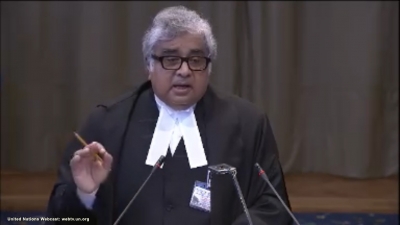Salve advocates mechanism to define 'free speech'
By IANS | Published: November 20, 2019 07:26 PM2019-11-20T19:26:04+5:302019-11-20T21:05:15+5:30
Former Solicitor General Harish Salve on Wednesday told the Supreme Court that it was necessary to formulate a regulatory mechanism to define contours of free speech.

Salve advocates mechanism to define 'free speech'
The government should come up with regulations to define the components of "free speech", the ones' protected under the Constitution and the ones' not, he contended.
"The state is under a constitutional duty to ensure that the rights of its citizens are not violated and to create an ecosystem in which these rights can be enjoyed in their activist dimension," said Salve.
The Constitution being a living document had to be interpreted in a manner so as to accommodate the competing rights of citizens to meet each emerging challenge that tended to disturb this balance, the veteran lawyer said.
He said the proposed regulatory mechanism might even address issues originating out of content on social media platforms, such as WhatsApp and Facebook. The apex court could test the regulatory mechanism, he added.
The apex court has appointed Salve to assist it as amicus curiae to examine whether elected representatives and politic can be restrained from making statements on pending criminal matters and, if they do, would it tantamount to curbing the fundamental right of free speech.
A five-judge Bench, headed by Justice Arun Mishra and comprising Justices Indira Banerjee, Vineet Saran, M.R. Shah and Ravindra Bhat, is hearing the matter.
Making his submission on the statements made by Ministers under the garb of free speech, Salve said a Minister was a constitutional functionary who was liable for damages if he committed a constitutional tort by violating the fundamental rights of a citizen.
"Fundamental rights have to be interpreted in harmony with each other so that each right may be exercised without disabling other fellow citizens from enjoying their freedoms and liberties", Salve said.
Salve also insisted that the interplay between the right to privacy and the right to free expression was crucial. Any comment by a member of the Cabinet of the government that tended to interfere with the course of an investigation or even capable of creating a public perception of the absence of fairness in the investigation was gross violation of Article 21 as well as the constitutional oath of office, he said.
When the court told him it couldn't direct Parliament to frame laws, Salve cited the Vishaka guidelines, a case of harassment of women at workplaces, where courts recommended the broader framework.
"You can recommend Parliament to frame law, citing them as broader principles", he told the court.
In reply, one of the judges on the Bench said, the court could put in place a mechanism, like Vishaka's case, to ensure that the rights of people were not violated.
The hearing will continue on Thursday.
( With inputs from IANS )
Open in app